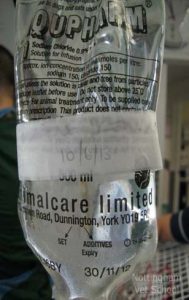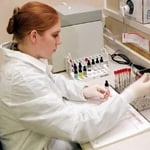Ron Hines DVM PhD
 See What Normal Blood & Urine Values Are
See What Normal Blood & Urine Values Are
 Causes Of Most Abnormal Blood & Urine Tests
Causes Of Most Abnormal Blood & Urine Tests
The Electrolytes In Your Pet’s Blood
Many of the causes for electrolyte disturbances are the same as the causes of an abnormal anion gap.
Electrolytes are the positively or negatively charged ions that circulate free in your pet’s blood stream and other body fluids. They are the charged halves, positively charged cations(+) and negatively charged anions(-) of the various mineral elements that are dissolved in your pet’s blood stream.
The important electrolytes are sodium (= Na+), potassium (= K+), calcium (= Ca2+) magnesium (= Mg2+), chloride (= Cl−), phosphate (= HPO42−) and CO2 (90% circulating as bicarbonate aka HCO3−).
Follow their name links to understand what problems make each one go up or down and the symptoms an imbalance of each is likely to produce in your pet.
The proper balance of electrolytes in your dog or cat’s blood is regulated by its kidneys; under the control of antidiuretic hormone (vasopressin = ADH, AVP) which is released by its pituitary gland. Aldosterone, produced by its adrenal glands, and parathyroid hormone (PTH) produced by the parathyroid glands in the pet’s neck also regulate electrolyte balance.
The Signs Of An Electrolyte Disturbance In Your Dog Or Cats Can Include:
Changes in your pet’s breathing patterns
Changes in its heart rate.
Muscle weakness
Anxiety
Depression
Without Treatment, Symptoms Tend To Steadily Become Worse And Can Result In Medical Emergencies.
Along with providing supplemental oxygen, one of the first things veterinarians at emergency centers check and correct are electrolyte imbalances. They do that by providing customized intravenous fluids designed to raise or lower specific blood electrolyte ion levels.
Some Common Causes Of Electrolyte Imbalance In Dogs And Cats That Come To Mind Are:
Sustained periods of vomiting
Diarrhea (as occurs in acute pancreatitis in dog, in cat, Addison’s disease, toxic ingestion, bacterial and viral enteritis and chronic kidney disease and uremia)
Dehydration
Higher than normal fluid loss through the urine, such as seen in diabetes or the overuse of diuretics such as furosemide (Lasix®)
Chronic intestinal disease, such as IBD or triaditis that limit electrolyte element absorption from food
FUS Feline Urological Syndrome, tumor-related or neurologically caused (neurogenic bladder) bladder obstruction in cats and dogs that prevent urination
Failure to eat a diet that is nutritionally balanced in its mineral content.
Gastrointestinal foreign bodies
Overuse of phosphate binding agents (and phosphate-containing enemas) can also cause electrolyte disturbances.
DxMe
You are on the Vetspace animal health website



